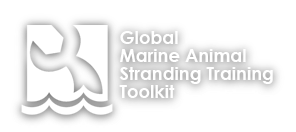About GMAST
The Global Marine Animal Stranding Toolkit is an ever-evolving, collaborative project that aims to provide widespread access to best practices and protocols in stranding response and investigation. Our initial focus is on marine mammals, but with time, we plan to expand to other species.
The ultimate purpose of this toolkit is to increase coordination in the marine animal stranding response community internationally. The toolkit is a work in progress. Based on feedback from trainers and users, training resources and content will be continually refined to disseminate information more effectively.
As response to marine mammal strandings develops on a more global scale, many professionals in the fields of conservation, marine mammal research, marine mammal health, and stranding response have recognized an inconsistent approach to the rescue and investigation of stranded cetaceans (dolphins, porpoises, and whales) and pinnipeds (seals and sea lions). This toolkit is designed to be a resource for the development of new stranding response networks and growth of existing networks. By providing internationally relevant training materials, professional training opportunities, and a comprehensive curriculum that addresses everything from volunteer recruitment and sustainable funding sources to specific data collection protocols, the GMAST team hopes to address the two main difficulties identified in previous stranding network training:
- Lack of standardized training resources and protocols, resulting in varying success and inconsistent data collection.
- Lack of follow through after initial training, resulting in a failure of networks to reach their full potential and meet the needs of the region.
The idea for a universally applicable marine mammal stranding response toolkit resulted from a series of discussions and engagements between scientists, veterinary professionals, and stranding responders with previous training experience from multiple international institutions led by the National Oceanic and Atmospheric Administration’s (NOAA) National Marine Fisheries Service (NMFS) and the International Fund for Animal Welfare (IFAW).
After identifying the recurring issues noted above, the team recognized that as a result, the care of live stranded animals was not always reaching the quality desired, nor was the data collection completed consistently enough to afford broader scale analyses among the groups. Additionally, many of the individuals and even groups that received training were unable to consistently continue with marine mammal stranding response.
Having established best practices enables training to be consistent and targeted to audience background, skill, and regional context. A standardized toolkit allows the marine mammal health and stranding response community to connect and share information about lessons learned. Also, a globally networked stranding response community facilitates consultation with experts about species identification, new tools, and techniques, as well as sharing of alerts about new or rare marine mammal species or disease outbreak in a region. Importantly, a connected community can aid in prioritizing resource investments in specific regions that require training, capacity building, and enhanced species conservation.
The toolkit is based on a “train the trainer” model, with the goal being to train key players in local and regional networks, who can then train multiple teams for “on the ground” response. This helps in building local capacity and expertise. Some basic concepts are provided for the general user interested in seeking training or information. Trainer registration is required to access specific modules. Materials will be used for training efforts by NMFS/NOAA, IFAW, and The Marine Mammal Center (TMMC) and will be made freely available to other trainers upon request. The key element for implementation is in-person, hands-on training for participants. Once trained, local network members (trainers) will have access to all materials via the website. Registration is provided when individuals receive their in-person training.
The current toolkit is focused on marine mammals, specifically cetacean and pinniped stranding response for core responders. In the future, these topics and training modules will be further developed in Intermediate and Advanced levels for the future growth and increased capacity of all participating networks. Once the basic level materials are complete and the website is fully functional, implementation and evaluation can begin. The core team involved in the design and development of the training modules included: Katie Moore and Brian Sharp (IFAW), Mridula Srinivasan and Sarah Wilkin (NMFS/NOAA), Claire Simeone (NMFS/NOAA and TMMC), and Michael Moore (Woods Hole Oceanographic Institution – WHOI). Expert guidance was provided by Teri Rowles (NMFS) and Frances Gulland (TMMC). Initial discussions and insights for toolkit development involved participants from Brazil, Spain, Chile, Argentina, the United Kingdom, Canada, the United States, and South Africa. Individual training modules were reviewed by cetacean and pinniped experts from Indonesia, the United Kingdom, Spain, Italy, Australia, and the United States.
For more information or feedback on any of the materials presented, please contact Mridula Srinivasan (mridula.srinivasan@noaa.gov) or Katie Moore (kmoore@ifaw.org)
